

Eliphas Levi. "Eliphas Levi", the name under which he published his books, was his attempt to translate or transliterate his given names "Alphonse Louis" into Hebrew although he was not Jewish.
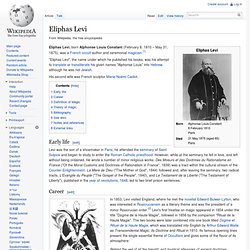
His second wife was French sculptor Marie-Noémi Cadiot. Early life[edit] Occult science. Occult science is the systematic research into or formulation of occult concepts in a manner that follows - in its method or presentation - the way natural science researches or describes phenomena of the physical world.
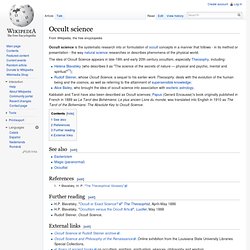
Aleister Crowley. Derinkuyu Underground City. Derinkuyu Underground City is an ancient multi-level underground city of the Median Empire in the Derinkuyu district in Nevşehir Province, Turkey.
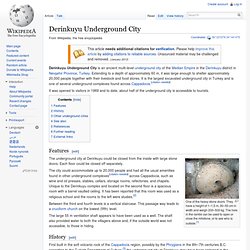
Extending to a depth of approximately 60 m, it was large enough to shelter approximately 20,000 people together with their livestock and food stores. It is the largest excavated underground city in Turkey and is one of several underground complexes found across Cappadocia. [citation needed] It was opened to visitors in 1969 and to date, about half of the underground city is accessible to tourists. Features[edit] Thule Society to the Nazi Party. Freemasonry. Freemasonry is a fraternal organisation that traces its origins to the local fraternities of stonemasons, which from the end of the fourteenth century regulated the qualifications of masons and their interaction with authorities and clients.
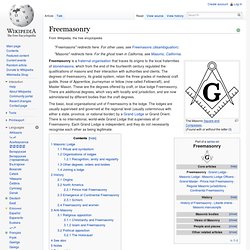
The degrees of freemasonry, its gradal system, retain the three grades of medieval craft guilds, those of Apprentice, journeyman or fellow (now called Fellowcraft), and Master Mason. These are the degrees offered by craft, or blue lodge Freemasonry. There are additional degrees, which vary with locality and jurisdiction, and are now administered by different bodies than the craft degrees. The basic, local organisational unit of Freemasonry is the lodge. The lodges are usually supervised and governed at the regional level (usually coterminous with either a state, province, or national border) by a Grand Lodge or Grand Orient. Masonic Lodge Palazzo Roffia, Lodge in Italy set out for French (Moderns) ritual.
Occult. Occult theories about Francis Bacon. Secret societies[edit] Francis Bacon often gathered with the men at Gray's Inn to discuss politics and philosophy, and to try out various theatrical scenes that he admitted writing.[1] Bacon's alleged connection to the Rosicrucians and the Freemasons has been widely discussed by authors and scholars in many books.[2] However others, including Daphne du Maurier (in her biography of Bacon), have argued there is no substantive evidence to support claims of involvement with the Rosicrucians.[3] Historian Dame Frances Yates[4] does not make the claim that Bacon was a Rosicrucian, but presents evidence that he was nevertheless involved in some of the more closed intellectual movements of his day.
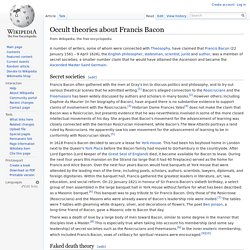
She argues that Bacon's movement for the advancement of learning was closely connected with the German Rosicrucian movement, while Bacon's The New Atlantis portrays a land ruled by Rosicrucians. In 1618 Francis Bacon decided to secure a lease for York House. Faked death theory[edit] Helena Blavatsky. Helena Petrovna Blavatsky (Russian: Еле́на Петро́вна Блава́тская, Ukrainian: Олена Петрівна Блаватська), born as Helena von Hahn (Russian: Елена Петровна Ган, Ukrainian: Олена Петрівна Ган; 12 August [O.S. 31 July] 1831 – 8 May 1891), was a Russian occultist.[1] In 1875, Blavatsky, Henry Steel Olcott, and William Quan Judge established a research and publishing institute called the Theosophical Society.
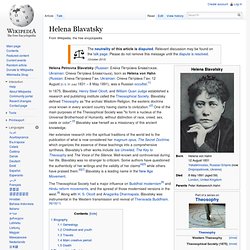
Blavatsky defined Theosophy as "the archaic Wisdom-Religion, the esoteric doctrine once known in every ancient country having claims to civilization. "[2] One of the main purposes of the Theosophical Society was "to form a nucleus of the Universal Brotherhood of Humanity, without distinction of race, creed, sex, caste or color".[3] Blavatsky saw herself as a missionary of this ancient knowledge. The Theosophical Society had a major influence on Buddhist modernism and Hindu reform movements, and the spread of those modernised versions in the west. Biography[edit] Aryan. Theosophy. Theosophy comes from the Greek theosophia (θεοσοφία), which combines theos (θεός), "God"[3] and sophia (σοφία), "wisdom," meaning "divine wisdom.
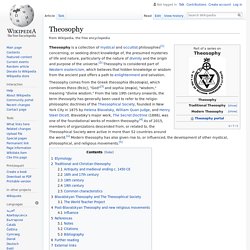
" St. Germain (Theosophy) Sir Francis Bacon. Polygenism. Origins[edit] Many oral traditions feature polygenesis in their creation stories.
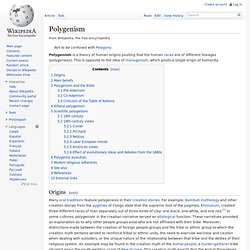
For example, Bambuti mythology and other creation stories from the pygmies of Congo state that the supreme God of the pygmies, Khonvoum, created three different races of man separately out of three kinds of clay: one black, one white, and one red.[1] In some cultures, polygenism in the creation narrative served an etiological function. These narratives provided an explanation as to why other people groups exist who are not affiliated with their tribe.
Moreover, distinctions made between the creation of foreign people groups and the tribe or ethnic group to which the creation myth pertains served to reinforce tribal or ethnic unity, the need to exercise wariness and caution when dealing with outsiders, or the unique nature of the relationship between that tribe and the deities of their religious system. The idea is also found in some ancient Greek and Roman literature. Main beliefs[edit] Pre-Adamism[edit] Aleister Crowley. After an unsuccessful attempt to climb Kanchenjunga and a visit to India and China, Crowley returned to Britain, where he attracted attention as a prolific author of poetry, novels, and occult literature.
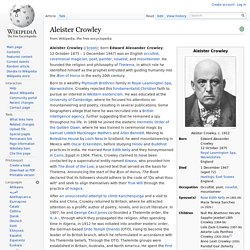
The Vril Society. YouTube. Thule Society. The Thule Society (/ˈθjuːliː/; German: Thule-Gesellschaft), originally the Studiengruppe für germanisches Altertum ("Study Group for Germanic Antiquity"), was a German occultist and völkisch group in Munich, named after a mythical northern country from Greek legend.
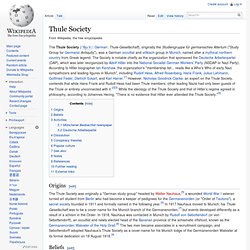
The Society is notable chiefly as the organization that sponsored the Deutsche Arbeiterpartei (DAP), which was later reorganized by Adolf Hitler into the National Socialist German Workers' Party (NSDAP or Nazi Party). Nazism and occultism. The origins of Nazism and its relation to the occult has been a part of popular culture since at least 1959. There are documentaries and books on the topic, including The Morning of the Magicians (1960) and The Spear of Destiny (1972). Historian Nicholas Goodrick-Clarke analyzed the topic in The Occult Roots of Nazism in which he argued cautiously for some real links between some ideals of Ariosophy and Nazi ideology. Vril. Vril, the Power of the Coming Race is an 1871 novel by Edward Bulwer-Lytton, originally printed as The Coming Race.
Among its readers have been those who have believed that its account of a superior subterranean master race and the energy-form called "Vril" is accurate, to the extent that some theosophists, notably Helena Blavatsky, William Scott-Elliot, and Rudolf Steiner, accepted the book as being (at least in part) based on occult truth.[1] A popular book, The Morning of the Magicians (1960) suggested that a secret Vril Society existed in pre-Nazi Berlin. However, there is no historical evidence for the existence of such a society. History[edit] Plot summary[edit] The novel centres on a young, independently wealthy traveller (the narrator), who accidentally finds his way into a subterranean world occupied by beings who seem to resemble angels and call themselves Vril-ya.
Bovril. Bovril in a 250 gram jar Bovril is the trademarked name of a thick, salty meat extract, developed in the 1870s by John Lawson Johnston and sold in a distinctive, bulbous jar. It is made in Burton upon Trent, Staffordshire, owned and distributed by Unilever UK. Bovril can be made into a drink by diluting with hot water, or less commonly with milk.[1] It can also be used as a flavouring for soups, stews or porridge, or spread on bread, especially toast, rather like Marmite. The first part of the product's name comes from Latin bos meaning "ox" or "cow". Johnston took the -vril suffix from Bulwer-Lytton's then-popular "lost race" novel The Coming Race (1870), whose plot revolves around a superior race of people, the Vril-ya, who derive their powers from an electromagnetic substance named "Vril".[2][3] History[edit] Poster for Bovril, about 1900 V&A Museum no.
Edward Bulwer-Lytton, 1st Baron Lytton. Edward George Earle Lytton Bulwer-Lytton, 1st Baron Lytton PC (25 May 1803 – 18 January 1873), was an English novelist, poet, playwright, and politician. He was immensely popular with the reading public and wrote a stream of bestselling novels which earned him a considerable fortune. He coined the phrases "the great unwashed",[1] "pursuit of the almighty dollar", "the pen is mightier than the sword", "dweller on the threshold", as well as the infamous opening line "It was a dark and stormy night".[2] Life[edit] Bulwer-Lytton was born on 25 May 1803 to General William Earle Bulwer of Heydon Hall and Wood Dalling, Norfolk and Elizabeth Barbara Lytton, daughter of Richard Warburton Lytton of Knebworth, Hertfordshire. He had two elder brothers, William Earle Lytton Bulwer (1799–1877) and Henry (1801–1872), later Lord Dalling and Bulwer.
When Edward was four his father died and his mother moved to London.